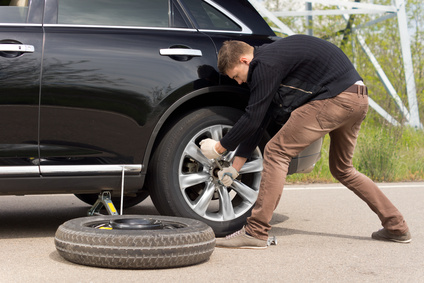Check your car. Does it have a spare tire or an inflator kit? If yes, then you’re set in case you have a flat tire.
Check your finances. Do you have an emergency reserve? You know, that savings account for unexpected events in life which may happen and impact you financially.
What are unexpected events? Unexpected events include (but are not limited to):
→ damage to your home and belongings due to Mother Nature (hurricane, earthquake), an accident (fire, fender-bender) or unforeseen maintenance (hot water heater leak);
→ medical diagnosis for you or a loved one (cancer, Alzheimer’s, assisted living); or
→ job loss.
While insurance may cover some expenses associated with an unexpected event, you may need to wait for reimbursement. How will you pay for these expenses during the interim? That’s where an emergency reserve is important.
It’s been recommended for emergency reserves to be at least 3 months of expenses for dual-income households and 6 months of expenses for single-income households. Given today’s economy, job loss is a reality for many people and that’s when they need to use their emergency reserve. How many people do you know found a job in 6 months?
Times are different and having 3- to 6-months of expenses in your emergency reserve may not be enough if you no longer have a job. It’s more realistic to target 9 months of expenses for dual-income households and 12 months of expenses for single income households. Keep in mind, the more money you make, the longer your job search process becomes – especially if you’re managing people and a P&L.
How much should be in my emergency reserve?
To calculate how much to save in your emergency reserve, first identify all expenses you would still have if you lost your job. Some expenses may be less than you currently spend (for example, your gas cost may go down but you still need to drive). Make sure to include expenses that you pay once or twice a year. Here are broad expense categories to use:
Housing (rent/mortgage, HOA fees, insurance, utilities, taxes)
Transportation (car payment, gas, insurance, ad valorem tax, maintenance, parking fees)
Personal care (dry cleaning, clothing, personal grooming items),
Food (groceries, dining out)
Health-related (COBRA, insurance, co-pay, fitness membership)
Dependent care (expenses for pets, children or elderly parent)
Entertainment (while this expense can be reduced greatly if you’re unemployed, you still need to account for money to have fun in life)
Gifts (another expense which can be reduced greatly, but you can be creative with offering a service like car washing or pet sitting)
Job search (mileage, meals with your connections, networking event fees, etc.)
Miscellaneous (bank fees, life insurance premiums, unsecured debt payments)
It’ll take years to accumulate that large amount!
Building your emergency reserve can be daunting when you look at the total amount. Break your target amount into smaller amounts and gradually add to your reserve. It’ll seem like an eternity before you accumulate the first $10,000 but after that amount it becomes easier.
Does it have to be cash only?
You’ve probably heard you need to keep your emergency reserve in cash, but don’t take that advice literally. The objective is to have quick access to your money for an unexpected event. Saving your money in cash equivalents such as a money market account may be acceptable to meet your objective. As you build your emergency reserve, you may want to consider using mutual funds which can easily be liquidated in 3 business days. The bottom line is your emergency reserve should be easy for you to access for an unexpected event in life. And remember, when you use your emergency reserve you’ll need to replenish it for the next unexpected event – similar to when you use your spare tire or inflator kit for a flat tire.
ABOUT THE AUTHOR:
 Niv Persaud, CFP®, CDFA™, CRPC®, is the Founder of Transition Planning & Guidance, LLC. Her firm bridges the gap between financial planning and coaching. Life is more than money. It’s about living the lifestyle you want and can afford. For that reason, she offers consulting services in three areas: financial review, life strategy and professional progression. Her approach capitalizes on techniques she learned throughout her career, including as a management consultant and as a financial advisor. Her services include spending plan, financial plan, divorce financial review, life strategy and professional progression. Niv actively gives back to her community through her volunteer efforts. She believes in living life to the fullest by cherishing friendships, enjoying the beauty of nature and laughing often — even at herself. Her favorite quote is by Erma Bombeck, “When I stand before God at the end of my life, I would hope that I would not have a single bit of talent left and could say ‘I used everything you gave me’.”
Niv Persaud, CFP®, CDFA™, CRPC®, is the Founder of Transition Planning & Guidance, LLC. Her firm bridges the gap between financial planning and coaching. Life is more than money. It’s about living the lifestyle you want and can afford. For that reason, she offers consulting services in three areas: financial review, life strategy and professional progression. Her approach capitalizes on techniques she learned throughout her career, including as a management consultant and as a financial advisor. Her services include spending plan, financial plan, divorce financial review, life strategy and professional progression. Niv actively gives back to her community through her volunteer efforts. She believes in living life to the fullest by cherishing friendships, enjoying the beauty of nature and laughing often — even at herself. Her favorite quote is by Erma Bombeck, “When I stand before God at the end of my life, I would hope that I would not have a single bit of talent left and could say ‘I used everything you gave me’.”

